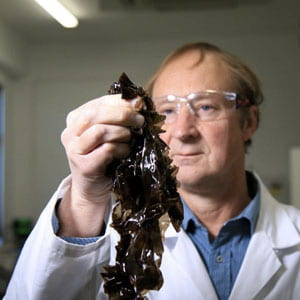Public Summary
Principal Investigator: Dr Tom Wheeler, Cawthron Institute
Industry partners: Wakatū Incorporation, Te Runanga o Ngāi Tahu, Hokkaido University, AgResearch, Malaghan Institute
High-Value Nutrition funding: $356,000
Karengo: Māori-led research into the health benefits of edible seaweed
This research programme studies the potential of a modern, high-value industry based around karengo, a type of native edible seaweed.
There are hundreds of varieties of native seaweeds growing along the coastlines of Aotearoa New Zealand. Some of these are traditionally eaten by Māori, but otherwise little is known about their potential as a nutritional food source or basis for commercial food production. Internationally, seaweeds form part of the diet in many places around the world, and in recent years seaweeds have been promoted as a trending new superfood, as well as an ethical choice for low environmental impact food production. Research has shown that some commonly eaten varieties of seaweed such as nori and wakame contain a range of health-promoting micronutrients and related substances. However, the composition or health-promoting potential of New Zealand’s endemic seaweeds has not yet been investigated in any depth.
This research programme is a collaboration between Cawthron Institute and two major South Island Māori enterprises, Te Rūnanga o Ngāi Tahu and Wakatū Incorporation, funded by the High-Value Nutrition National Science Challenge under the Māori Food and Beverage Innovation Fund.
The goal of the research is to enable a new industry based on sustainable production and high-value marketing of karengo. This type of native Aotearoa New Zealand seaweed is traditionally eaten by Māori. Karengo comprises several related species that are mostly within the Pyropia family of red seaweeds. Karengo is similar to nori, which is widely eaten in Eastern Asia and familiar worldwide as the wrapping around sushi.
The research team will sample karengo from several sites around the South Island and determine the content of micronutrients and other health-promoting substances. Using advanced techniques, the team will also look for unexpected or newly discovered substances in karengo that may contribute to its health-promoting effects. Finally, the biological effects that extracts from karengo have on living systems will be determined, in order to understand how they might contribute to the health-promoting effects of karengo.
The outputs of this programme are likely to lead to further research to optimise karengo cultivation and commercial-scale production in the Aotearoa New Zealand setting. In addition, the project will investigate the best approaches to incorporating karengo as a high-value ingredient in premium manufactured foods.
Ultimately, this research will provide the knowledge-base to enable a future karengo export industry based on its demonstrated consumer satisfaction and health-promoting attributes, along with its distinct New Zealand origin.
Research Team

Tom Wheeler
Tom is a molecular physiologist. He is currently investigating algal composition and health benefits.
Tom has over 20 years of research expertise in milk composition and function. During this time he has pulled together multidisciplinary teams of researchers and worked collaboratively with industry on a range of science that has added significant value to industry stakeholders.
This work includes:
- identifying bioactives in milk and its processing streams
- evaluating the commercial potential of low-value processing streams
- identifying and evaluating health biomarkers in both humans and cattle
- investigating the uptake of micronutrients contained in milk within the human digestive tract.
Tom has experience working with sector groups to put together research proposals and funding applications. He is building partnerships with New Zealand’s biological industries to deliver innovation in his role at Cawthron Institute.